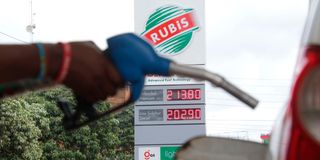
A pump attendant fills a motorist's tank with fuel at a petrol station in Nyeri town on January 14, 2024.
The government has admitted that Kenyans are paying at least Sh4 more per litre of super petrol and diesel following the upward review of the controversial road maintenance levy (RML) last month.
The pump price of diesel got the worst hit with motorists having to pay at least Sh5.20 more after the imposition of the levy.
Petroleum Principal Secretary Mohamed Liban said that before the revision of the RML, the projected prices of super petrol and diesel were to be reduced by Sh5.27 per litre and Sh6.74 per litre, respectively.
However, the Energy and Petroleum Regulatory Authority (Epra) last month announced a drop of only Sh1 for super petrol and Sh1.50 for diesel in the pricing cycle covering between July 15 and August 14, 2024.
The price changes mean consumers in Nairobi have been paying a maximum of Sh188.84 for a litre of super petrol and Sh171.60 for a litre of diesel.
“Prior to the revision of the RML, the projected price of super petrol, diesel and kerosene were to reduce by Sh5.27 per litre, Sh6.74 per litre and Sh0.23 per litre, respectively,” said Mr Liban in a documented submitted to the Senate Energy committee.
“However, pursuant to the notice of July 10 by (former Roads cabinet secretary) Kipchumba Murkomen, Epra had to include the revised rates of the RML in the computation of applicable prices for the period between July 15 and August 14, 2024,” he added.
Potential price decrease
The development comes after the committee chaired by Nyeri Senator Wahome Wamatinga pushed for an explanation of the potential price decrease that the upward revision of the levy denied customers.
This came at a time when the reduction of the weighted average cost for all imports dropped by Sh7.33 per litre of petrol and Sh4.05 per litre of diesel compared to the previous pricing cycle.
However, PS Liban said the computation of petroleum pump prices considers the landed cost which is the weighted average costs of imported super petrol, diesel and kerosene; storage and distribution costs, gross margins and applicable taxes and levies.
In effect, he pointed out that the gazette notice by Mr Murkomen, which came into effect on July 15, 2024, led to an upward revision of pump price on both super petrol and diesel by Sh7 per litre.
“This therefore means that the impact on the pump is an increase of Sh8.12 per litre inclusive of value added tax,” he said.
The committee also wanted to know whether Epra conducted public participation on the impact of increasing the levy on the pump price.
The PS, however, said Section 3(1) of the Road Maintenance Levy Fund Act provides that the minister (in charge of Roads and Transport), in consultation with the minister for the time being responsible for finance, by order published in the Gazette, impose on any or all petroleum fuels entered for home use in Kenya a road maintenance levy which may be determined from time to time and in such manner as the minister may specify in the Order.
“Public participation was therefore not to be conducted by Epra but the minister responsible for reviewing the Roads Maintenance Levy as provided for in the Act,” he said.
Controversy has, nonetheless, continued to stalk the levy increase with different stakeholders calling for its reversal.
The Law Society of Kenya termed the Sh7 per litre hike illegal and unconstitutional, saying it was done without proper Parliamentary scrutiny hence a blatant breach of constitutional provision.
Billions of shillings
“The LSK calls for the immediate reversal of this unconstitutional and procedural action, failure to which we will take such measures as may be necessary to ensure full compliance with the law by the government,” said the LSK President Ms Faith Odhiambo.
“We were not in support of the proposal to increase the levy, even the ministry expressed reservations only to see that it has been effected,” said Job Wanjohi, head of policy research and advocacy at Kenya Association of Manufacturers.
“We need a legal opinion on it to understand if it was done right in terms of its implementation.”
Motorists have also questioned the rationale behind the increment of the levy, arguing that the Ministry of Transport has little to show on how it has deployed billions of shillings raised under the levy.
“This (increment of the levy to Sh25 per litre) is despite submitted objections from the stakeholders and the general public,” the Motorist Association of Kenya said Monday.
However, the government has defended the hike, saying it hopes to raise upwards of Sh115 billion by June next year from the higher RML to boost the pool of funds available to maintain the country’s 239,122-kilometre road network.







